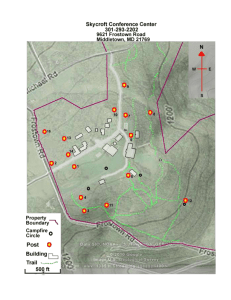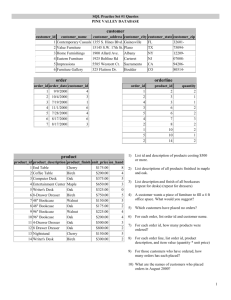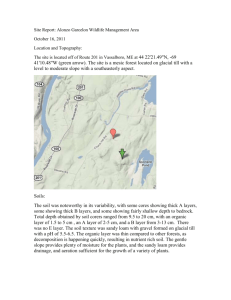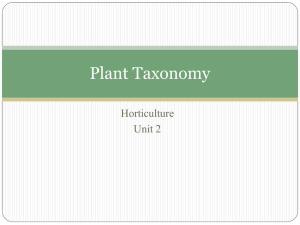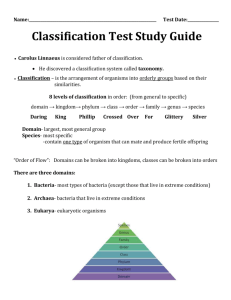HONORS BIOLOGY FIRST QUARTER PROJECT
advertisement
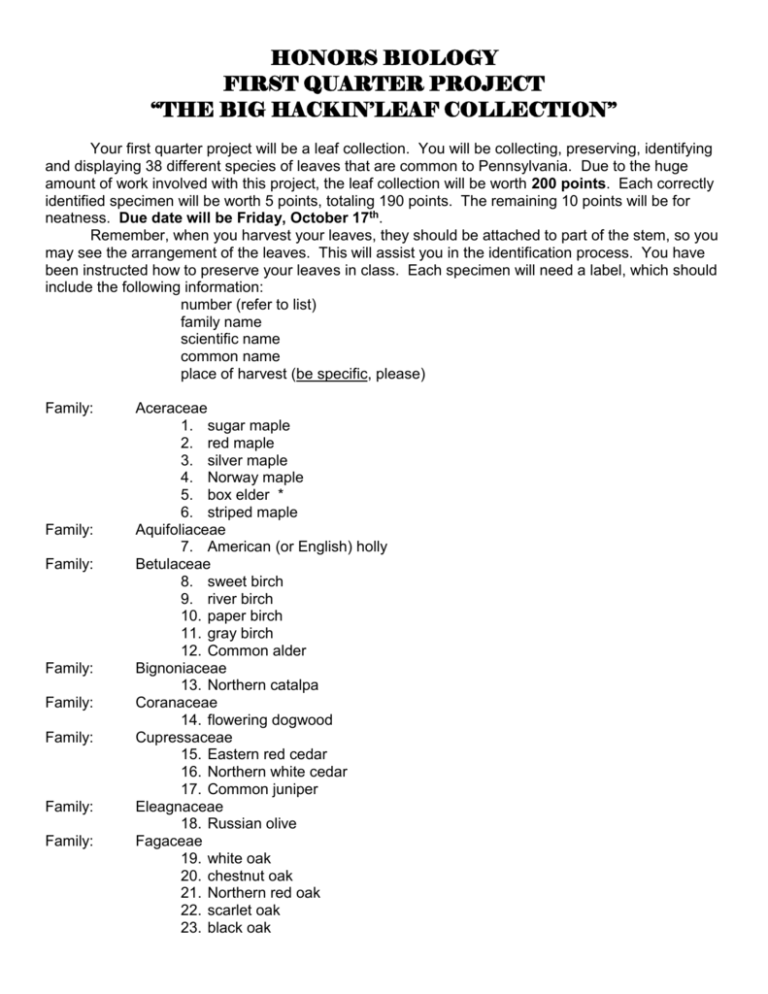
HONORS BIOLOGY FIRST QUARTER PROJECT “THE BIG HACKIN’LEAF COLLECTION” Your first quarter project will be a leaf collection. You will be collecting, preserving, identifying and displaying 38 different species of leaves that are common to Pennsylvania. Due to the huge amount of work involved with this project, the leaf collection will be worth 200 points. Each correctly identified specimen will be worth 5 points, totaling 190 points. The remaining 10 points will be for neatness. Due date will be Friday, October 17th. Remember, when you harvest your leaves, they should be attached to part of the stem, so you may see the arrangement of the leaves. This will assist you in the identification process. You have been instructed how to preserve your leaves in class. Each specimen will need a label, which should include the following information: number (refer to list) family name scientific name common name place of harvest (be specific, please) Family: Family: Family: Family: Family: Family: Family: Family: Aceraceae 1. sugar maple 2. red maple 3. silver maple 4. Norway maple 5. box elder * 6. striped maple Aquifoliaceae 7. American (or English) holly Betulaceae 8. sweet birch 9. river birch 10. paper birch 11. gray birch 12. Common alder Bignoniaceae 13. Northern catalpa Coranaceae 14. flowering dogwood Cupressaceae 15. Eastern red cedar 16. Northern white cedar 17. Common juniper Eleagnaceae 18. Russian olive Fagaceae 19. white oak 20. chestnut oak 21. Northern red oak 22. scarlet oak 23. black oak Family: Family: Family: Family: Family: Family: Family: Family: Family: Family: Family: Family: Family: Family: 24. pin oak 25. burr oak 26. black jack oak 27. American beech 28. American chestnut Ginkgoaceae 29. ginkgo Hamamelidaceae 30. sweetgum 31. witch hazel Hippocastanaceae 32. common horsechestnut * Juglandaceae 33. Eastern black walnut * 34. shagbark hickory * 35. pignut hickory * Lauraceae 36. common sassafras (all 3 types) Leguminosae 37. black locust * 38. honey locust * 39. redbud Magnoliaceae 40. tulip tree 41. cucumber magnolia Oleaceae 42. white ash * 43. common lilac 44. black ash * 45. mountain ash * Pinaceae 46. Eastern hemlock 47. Eastern white pine 48. red pine 49. pitch pine 50. tamarack (larch) 51. Norway spruce 52. fir (genus) Plantanaceae 53. sycamore Rosaceae 54. hawthorn (genus) 55. cherry (genus) Salicaceae 56. willow (genus) 57. quaking aspen 58. big toothed aspen 59. Lombardy poplar Simarubaceae 60. tree of heaven * Tiliaceae 61. basswood Family: Ulmaceae 62. American elm 63. slippery elm Some helpful hints: Don’t wait until October to start collecting. Go with your friends and family. It is amazing what a walk in the woods can do for one’s spirit. Don’t be afraid to ask for help. As most of you couldn’t tell an oak from a maple, I know that by the end of this project, you will have gained knowledge which will last a lifetime. Hopefully this will begin or reinforce a life long love of nature. Please be prepared to bring your leaves in during a designated time during the first quarter so we can discuss your newly gained tree knowledge. Good luck and please don’t hesitate to ask for help!!!!!!!!!! Mrs. Weinrich
